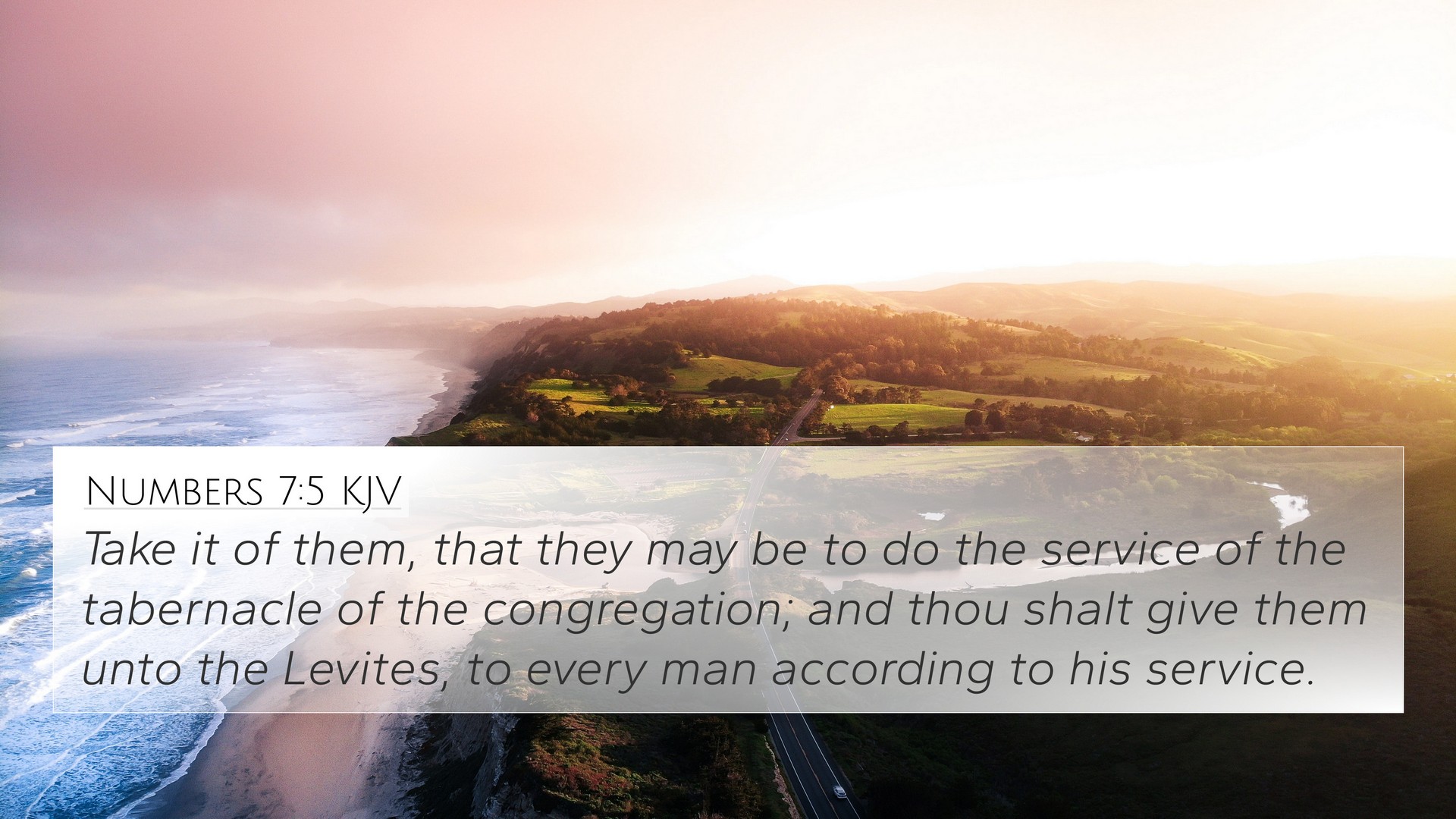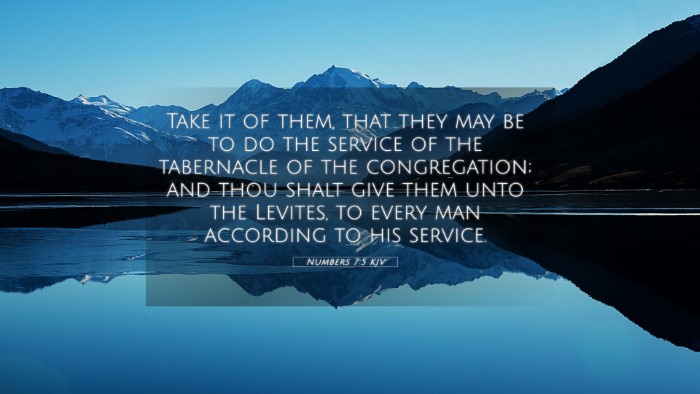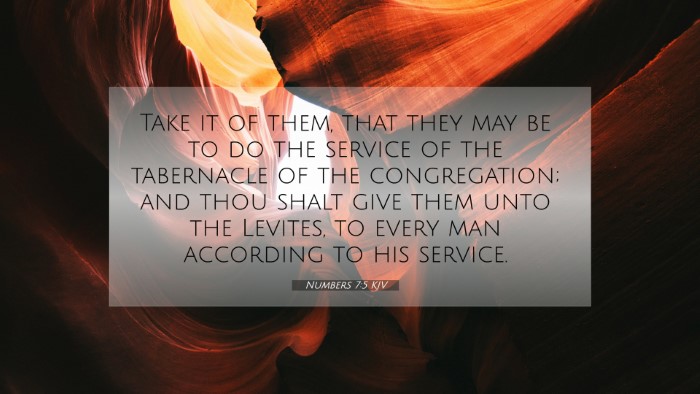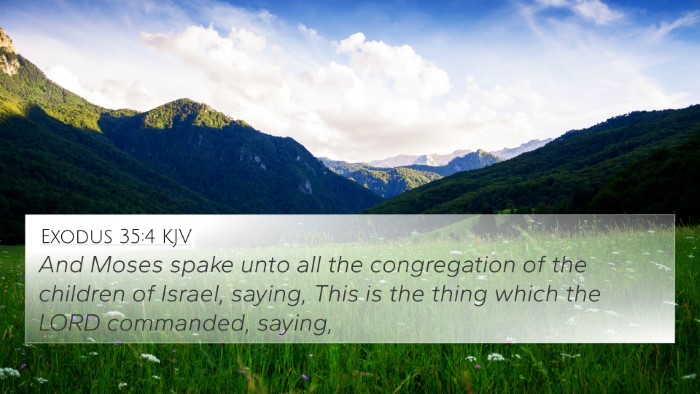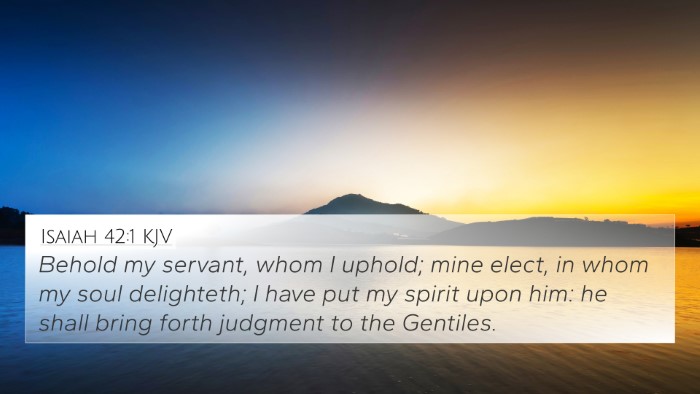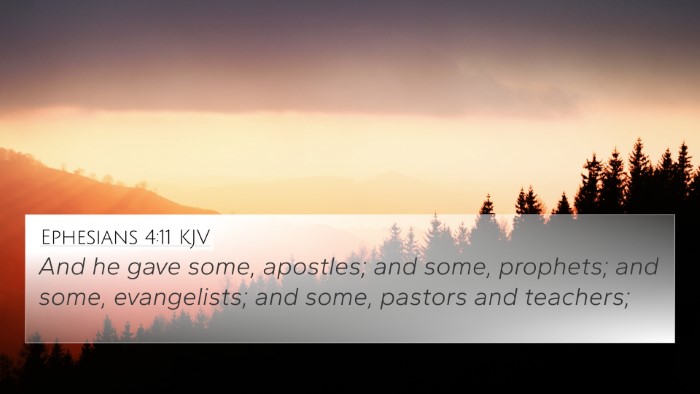Understanding Numbers 7:5
Numbers 7:5 states: "Take it of them, that they may be to do the service of the tabernacle of the congregation; and thou shalt give them to the Levites, to every man according to his service." This verse highlights the organization and delegation of responsibilities among the Israelite tribes, specifically concerning the service in the tabernacle.
Verse Context
This verse is situated within a broader context where Moses receives instructions on the offerings from the leaders of the tribes of Israel. It emphasizes the significance of the Levites as the appointed caretakers of the tabernacle, showcasing the importance of divine order in worship and community service.
Insights from Public Domain Commentaries
Matthew Henry notes that the gifts brought forth by the leaders signify their free-will offerings and dedication to God’s service. He emphasizes that these gifts were to support the Levites in their roles as caretakers of the holy places, an acknowledgment of their unique position among the tribes.
Albert Barnes explains that the distribution of responsibilities and the offerings for the Levites was essential to ensure that each individual was recognized for their service. This was instrumental in maintaining order within the community and ensuring that the tabernacle's functions were conducted efficiently.
Adam Clarke elaborates on the importance of the Levites, noting that they were set apart for God's work and required support from the other tribes. He underlines the cooperative aspect of worship, highlighting how each tribe contributed to the well-being of the priestly class, thereby underlining community interdependence.
Thematic Connections and Cross-References
Numbers 7:5 is connected to various other Bible verses which share similar themes of sacrifice, service, and community. Below are some Bible cross-references that expand upon these themes:
- Exodus 28:1: Discusses the appointment of Aaron and his sons as priests, establishing a framework for Levitical duties.
- Leviticus 8:30: North the consecration of Aaron and his sons as priests, reinforcing their sacred role in tabernacle service.
- Numbers 3:6-10: Describes the duties assigned to the Levites and their role in the tabernacle, emphasizing their importance in service.
- 1 Chronicles 23:13: Reflects on the lineage of Aaron and the continuous Levitical priesthood as established by God.
- Hebrews 7:5: Connects the Levitical priesthood to the New Testament, illustrating the ongoing significance of their roles.
- Nehemiah 10:39: Addresses how the people were to bring their tithes to support the Levites, showing communal responsibility.
- Isaiah 66:21: Envisions the future work of the priests from among the nations, highlighting the universality of priestly service.
Inter-Biblical Dialogue
This verse opens a fascinating dialogue between various biblical texts. The organizational structure of the Levitical priesthood in Numbers can be paralleled with New Testament discussions on church order and service. For example, in 1 Peter 2:9, believers are called a “royal priesthood,” connecting the historical roles of the Levites to the New Covenant community. Such parallels create a deep intertextuality that enriches our understanding of service and dedication to God.
Comparative Study of Themes
When analyzing the themes of sacrifice and service, one can notice recurrent motifs throughout scripture. The detailed regulations in Numbers set the stage for understanding sacrificial worship, which is echoed in the more spiritual sacrifices spoken of in Romans 12:1, urging believers to present their lives as living sacrifices.
Tools for Bible Cross-Referencing
To foster a deeper understanding of these connections, utilizing bible concordance tools and cross-reference Bible study guides can be tremendously beneficial. Engaging in cross-referencing Bible study methods allows for exploring the themes and connections established across different texts.
Conclusion
Numbers 7:5 serves as an essential verse illuminating the structured service of the Levites and the significance of community support in spiritual matters. By cross-referencing key biblical texts, one can better appreciate the profound themes of service, dedication, and interdependence found throughout Scripture. As we engage with these texts, we can glean insights not just about the ancient community of Israel, but also about our collective identity as part of a royal priesthood in Christ.
